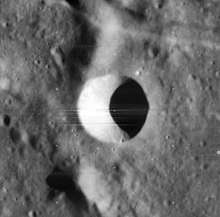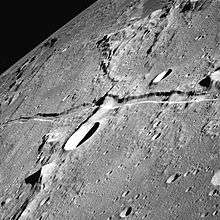Silberschlag (crater)
Silberschlag is a small, circular Impact crater in the central portion of the Moon. It was named after German astronomer Johann Silberschlag.[1] It lies between the craters Agrippa to the southwest and Julius Caesar to the northeast. Silberschlag is bowl-shaped and is joined at the northern rim by a small ridge.
 Lunar Orbiter 4 image | |
| Coordinates | 6.2°N 12.5°E |
|---|---|
| Diameter | 13 km |
| Depth | 2.5 km |
| Colongitude | 348° at sunrise |
| Eponym | Johann Silberschlag |
Just to the north is the prominent Rima Ariadaeus, a wide, linear rille that runs toward the east-southeast. This cleft is about 220 kilometers in length, and continues to the edge of Mare Tranquillitatis to the east.
Satellite craters
By convention these features are identified on lunar maps by placing the letter on the side of the crater midpoint that is closest to Silberschlag.
| Silberschlag | Latitude | Longitude | Diameter |
|---|---|---|---|
| A | 6.9° N | 13.2° E | 7 km |
| D | 7.5° N | 11.2° E | 4 km |
| E | 5.2° N | 12.8° E | 4 km |
| G | 5.7° N | 13.8° E | 3 km |
| P | 6.7° N | 12.0° E | 25 km |
| S | 8.0° N | 12.1° E | 34 km |
gollark: PotatOS is better.
gollark: Oh, yes, that.
gollark: @Terrariola#0000 How do you know I am?
gollark: @Keanu73#0000 /warp choruscity
gollark: @Keanu73#0000 I have many bases.
References
- "Silberschlag (crater)". Gazetteer of Planetary Nomenclature. USGS Astrogeology Research Program.
- Andersson, L. E.; Whitaker, E. A. (1982). NASA Catalogue of Lunar Nomenclature. NASA RP-1097.CS1 maint: ref=harv (link)
- Bussey, B.; Spudis, P. (2004). The Clementine Atlas of the Moon. New York: Cambridge University Press. ISBN 978-0-521-81528-4.CS1 maint: ref=harv (link)
- Cocks, Elijah E.; Cocks, Josiah C. (1995). Who's Who on the Moon: A Biographical Dictionary of Lunar Nomenclature. Tudor Publishers. ISBN 978-0-936389-27-1.CS1 maint: ref=harv (link)
- McDowell, Jonathan (July 15, 2007). "Lunar Nomenclature". Jonathan's Space Report. Retrieved 2007-10-24.CS1 maint: ref=harv (link)
- Menzel, D. H.; Minnaert, M.; Levin, B.; Dollfus, A.; Bell, B. (1971). "Report on Lunar Nomenclature by the Working Group of Commission 17 of the IAU". Space Science Reviews. 12 (2): 136–186. Bibcode:1971SSRv...12..136M. doi:10.1007/BF00171763.CS1 maint: ref=harv (link)
- Moore, Patrick (2001). On the Moon. Sterling Publishing Co. ISBN 978-0-304-35469-6.CS1 maint: ref=harv (link)
- Price, Fred W. (1988). The Moon Observer's Handbook. Cambridge University Press. ISBN 978-0-521-33500-3.CS1 maint: ref=harv (link)
- Rükl, Antonín (1990). Atlas of the Moon. Kalmbach Books. ISBN 978-0-913135-17-4.CS1 maint: ref=harv (link)
- Webb, Rev. T. W. (1962). Celestial Objects for Common Telescopes (6th revised ed.). Dover. ISBN 978-0-486-20917-3.CS1 maint: ref=harv (link)
- Whitaker, Ewen A. (1999). Mapping and Naming the Moon. Cambridge University Press. ISBN 978-0-521-62248-6.CS1 maint: ref=harv (link)
- Wlasuk, Peter T. (2000). Observing the Moon. Springer. ISBN 978-1-85233-193-1.CS1 maint: ref=harv (link)
| Wikimedia Commons has media related to Image:Rima Ariadaeus-1.jpg. |
External links
This article is issued from Wikipedia. The text is licensed under Creative Commons - Attribution - Sharealike. Additional terms may apply for the media files.
